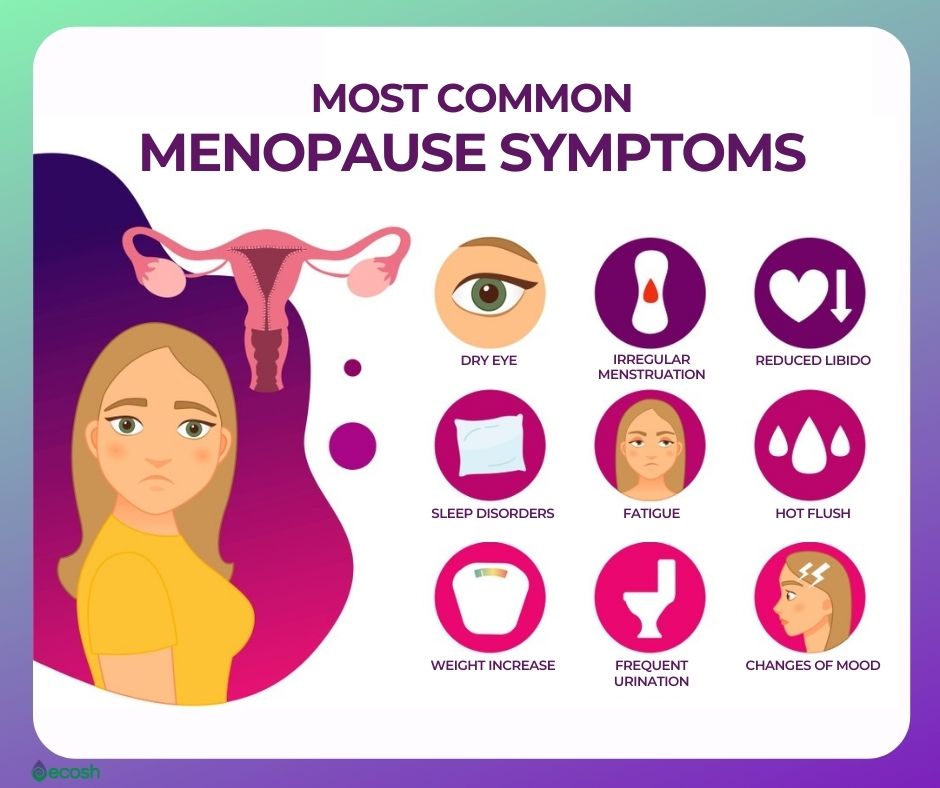
5 Common Menopause Symptoms to Look Out For
Below are 5 solutions to the 5 most common symptoms in midlife women. It is important to talk to your healthcare provider if you have any concerns. There are some potentially harmful side effects or treatments. You can talk with your healthcare provider and choose bioidentical hormones or an option that works best for you.
1. Mood Changes
There are some who find the fluctuations that come with perimenopause that create a feeling like they are out of control. There are reports of increased anxiety, irritability, blue moods, fatigue, etc. stress-reductions techniques and relaxation can help. Some common options are massages, deep-breathing exercises, and following a healthy lifestyle (exercise and good nutrition). Find self-nurturing activities you enjoy. There are some who also choose to deal with menopause symptoms by using over-the-counter medication like Vitamin B6 or St John’s wort.
When you talk with your healthcare provider about your mood issues, they can help in identifying the cause, look out for severe depression, and provide you with the best treatment approach. If it is depression, they can prescribe antidepressant medications that can help in correcting chemical imbalances. While it is going to take a couple of weeks for these drugs to have a full effect, many saw good results with very few side effects. Some of the medications have also helped people suffering from hot flashes. Antidepressant treatment works well when it is used alongside psychotherapy or counseling.
2. Urinary Incontinence
This is a condition that leads to persistent loss of urine and it is persistent, but for most women, it is an unwelcome, unfortunate, and unwanted annoyance. There are some strategies that can be used in dealing with the condition without surgery or medication. You should drink adequate water so that it dilutes the urine (it becomes clear and pale yellow). You need to avoid beverages and foods that are high in caffeine content or high in acid; they can lead to irritation of the bladder lining. These include oranges, grapefruit, coffee, tomatoes, and soft drinks that contain caffeine. You can also strengthen the pelvic floor muscles and reduce the episodes through Kegel exercises.
3. Night Sweats
If you want to deal with night sweats (the hot flashes occurring when you sleep), then you should consider different strategies to cool down when sleeping:
Dressing in light clothes
Using layered bedding that you can easily remove at night
You can also try wicking materials for your bedding and clothes
Sipping cooling water at night
Cooling down with an electric fan
Get a frozen cold pack and put it under the pillow then turn over the pillow regularly so you can have your head on a cool surface. You can also have a cold pack for your feet.
4. Trouble Falling Asleep
You should have a sleep schedule and sleep routine;
Waking up and going to the bed at the same time, even during the weekends
Winding down and relaxing before going to sleep by listening to music, reading a book, or taking a bath
Drinking a cup of milk and peanuts because they contain tryptophan, helps the body relax.
You can also see good results using chamomile tea
Your bedroom should have a comfortable level of temperature, noise, and light – a dark, cool, and quiet room makes it easier to fall and remain asleep
Your bedroom should be used for only sleep and sex
Avoid alcohol and caffeine late in the day
6. Sexual Discomfort
Menopause can contribute to sexual function changes because there is decreased ovarian hormone production that can cause vaginal dryness and sexual function dropping. There are some things you can try to counter these changes.
Vaginal lubricants: you don’t need a prescription for these. They decrease friction and ease intercourse. It is best to use water-soluble products because oil-based products like Vaseline can make things worse by increasing irritation. Only use products that have been designed for the vagina; avoid lotions and hand creams that contain perfume or alcohol. You also need to avoid tingling/warming and flavored lubricants because they can easily irritate tender tissues. There are many options on the market when it comes to vaginal lubricants; some of them are Moist Again, Astroglide, and Silk-E.
Vaginal moisturizers: you can buy them without a prescription. They improve or maintain vaginal moisture for those suffering from mild vaginal atrophy (this is a condition where the lining of the vagina and the tissues of the vulva become dry, thin, less lubricated, and less elastic because there is a loss of estrogen). They help in keeping vaginal pH low, which is important for a healthy vaginal environment. Some options include K-Y Long-lasting Vaginal Moisturizers and Replens. compared to lubricants, they have a more lasting effect.
Regular sexual stimulation: another option for maintaining vaginal health is by engaging in painless sexual activity regularly. This is going to help because it will promote the flow of blood to the genitals.







